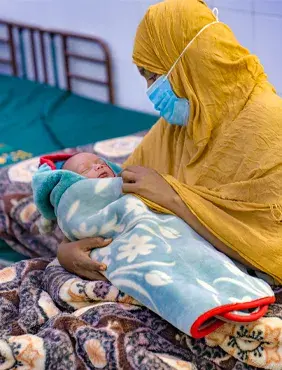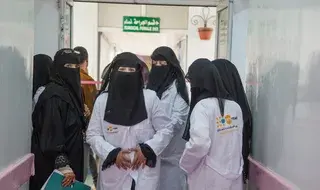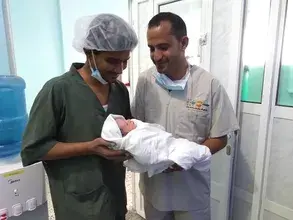After nine years of conflict, the needs in Yemen remain immense. Over half of the country’s population, 18.2 million people, require some form of humanitarian assistance in 2024.
This is the result of multiple, overlapping emergencies pummelling the country: Violent conflict, economic collapse, recurrent climate-change-induced disasters, and severely disrupted public services, with recent regional conflict dynamics adding further layers of vulnerability.
Women and girls hardest hit
Women and girls continue to bear the brunt of the crisis. An estimated 80 per cent of the 4.5 million people displaced in Yemen are women and children and around one-quarter of displaced households are headed by women.
Early and child marriage puts women and children at further risk of health complications, especially those who are malnourished. Going into labour when too young puts enormous strain on a girl’s body, which can lead to debilitating conditions like obstetric fistula, and even death.
Child marriage also casts a long shadow on mental well-being of both women and their children. More than 30 per cent of girls in Yemen are married before the age of 18, and the highest death rates of children under five years old are among mothers who are younger than 20 (54 per 1,000 live births), which serves as another stark reminder of the consequences of early marriage.
Gender-based violence has become endemic in Yemen, with more than 6.3 million women and girls at heightened risk of its various forms, including harmful traditional practices such as female genital mutilation. With limited shelter options and a breakdown in formal and informal protection mechanisms, girls are increasingly vulnerable to child marriage, human trafficking, forced begging, and child labour, among others. Women and girls with disabilities and marginalized groups face an even greater risk of gender-based violence, available services are not equipped to accommodate their needs.
Access to comprehensive gender-based violence response remains insufficient across Yemen, with 90 per cent of rural areas lacking these services. Female heads of households, women with disabilities, and those belonging to minority or migrant communities often face even greater obstacles due to compounded vulnerabilities and discrimination, further limiting their access to life-saving support and pursuing justice.
Health needs of women and girls remain urgent
Of the 17.8 million in need of health assistance in 2024, one quarter are women. Some 5.5 million women of reproductive age, including pregnant and lactating women, face challenges accessing reproductive health services, especially in rural and frontline districts. This is due to the non-availability of specialized female doctors and nurses, insufficient essential medical supplies, and limited access to services. Restrictions on the movement of female aid workers across governorates has further compounded the situation in northern parts of the country.
Maternal mortality rates in Yemen remain high, with one woman dying in childbirth every two hours, mostly from causes that are entirely preventable. Fewer than half of all births are assisted by skilled medical personnel and only one third take place in a health facility. Women of childbearing age, particularly pregnant and lactating women, have limited or no access to reproductive health support, including antenatal care, safe delivery services, postnatal care, family planning and emergency obstetric and newborn care.
Over 2.7 million pregnant and breastfeeding women are projected to require treatment for acute malnutrition in 2024. They risk giving birth to newborns with severely stunted growth and nursing malnourished infants due to rising food insecurity.
This is compounded by extreme shortages of essential medicines, supplies and specialized staff, as only one in five of functioning facilities is able to provide maternal and child health services.
Mental health needs soar
The cumulative impact of conflict and deprivation has also taken a heavy toll on the mental health of Yemenis, particularly its women and girls. Mental health care remains scarce, and psychological illness is highly stigmatized. An estimated 7 million people require mental health treatment and support, but only 120,000 have uninterrupted access to these services.




